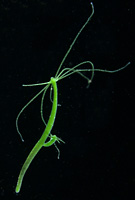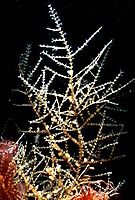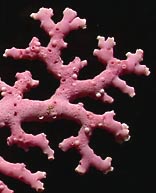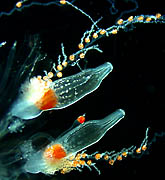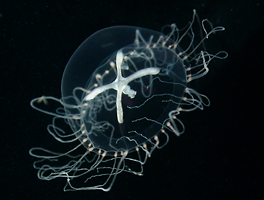Current number of accepted species in our list: 3 826
Introduction
The Class Hydrozoa is morphologically the most diverse group of cnidarians. Although marine species vastly outnumber freshwater ones, the freshwater genus Hydra may nevertheless represent the best-known hydrozoan. It is dealt with in almost all invertebrate biology textbooks, but this simple animal is not at all representative of the Hydrozoa as a whole, and may actually give a false impression of the real complexity of this animal group. For an in depth introduction to the morphology and classification of the Hydrozoa, see Bouillon et al. (2006).
The World Hydrozoa Database includes all extant hydrozoan species and is intended to act as a tool for anyone looking for taxonomic information, both specialists and non-specialists alike. The data are based on a species inventory initially compiled by Wim Vervoort and Peter Schuchert (see Schuchert, 1989) and later completed with the help of the Zoological Record. The list of the Siphonophorae was completed by Gill Mapstone. Likewise, the Stylasteridae were completed and checked by Stephen Cairns. New hydrozoan species will be added continuously by the editors.
The number of known hydrozoan species is about 3,800, although the status of many nominal species is
currently uncertain. A considerable number of names could also represent species complexes (see e.g.
Postaire et al., 2017). The list
of currently accepted names is estimated to be at least 98% complete.
Although more detailed classifications have been proposed recently, the one given in Cartwright & Collins
(2007) is used here, despite the fact that some non-monophyletic groups are still present. Further
molecular phylogenetic investigations will certainly help to stabilize the taxonomic system in the near
future.
No guarantee for the correctness of the data can be given. Please inform the editor responsible for the group of any omissions, errors or typos, or if you need to confirm some crucial data. If you disagree with a synonym, genus assignment or other taxonomic decision, please, send in your reasoned argument to the editors. We will evaluate each contribution and corrections will be incorporated quickly.
Please note that all distribution data are still incomplete and not all synonyms and unaccepted combinations are entered yet.
Quick access
-
Class Hydrozoa
-
Subclass Hydroidolina
-
Order Anthoathecata
- Suborder Aplanulata
- Suborder Capitata
- Suborder Filifera
- Order Leptothecata
- Order Siphonophorae
-
Order Anthoathecata
-
Subclass Trachylinae
- Order Actinulida
- Order Limnomedusae
- Order Narcomedusae
- Order Trachymedusae
-
Subclass Hydroidolina
Editors
- Choong, Henry - Taxonomic editor [Hydrozoa]
- Hoeksema, Bert - Taxonomic editor [Milleporidae, Stylasteridae]
- Lindsay, Dhugal - Taxonomic editor [Siphonophorae, Trachylinae]
- Mańko, Maciej - Taxonomic editor [Siphonophorae, Trachylinae]
- Pica, Daniela - Taxonomic editor [Stylasteridae]
- Boero, Nando - Former taxonomic editor
- Cairns, Stephen - Former taxonomic editor [Stylasteridae]
- Mapstone, Gill - Former taxonomic editor [Siphonophorae]
- Pugh, Phil - Former taxonomic editor [Siphonophorae]
- Galea, Horia - Former taxonomic editor [Hydrozoa]
- Schuchert, Peter - Former chief taxonomic editor [Hydrozoa] (2008-2025)
Citation
Usage of data from the World Hydrozoa Database in scientific publications should be acknowledged by citing as follows:- Schuchert, P.; Choong, H.; Galea, H.; Hoeksema, B.; Lindsay, D.; Mańko, M.; Pica, D. (2026). World Hydrozoa Database. Accessed at https://www.marinespecies.org/hydrozoa on 2026-02-22. doi:10.14284/357
Individual pages are individually authored and dated. These can be cited separately: the proper citation is provided at the bottom of each page.
